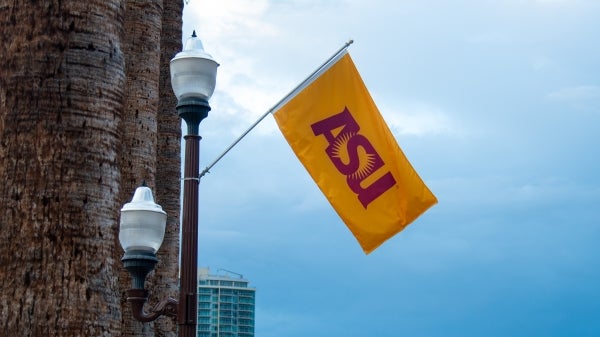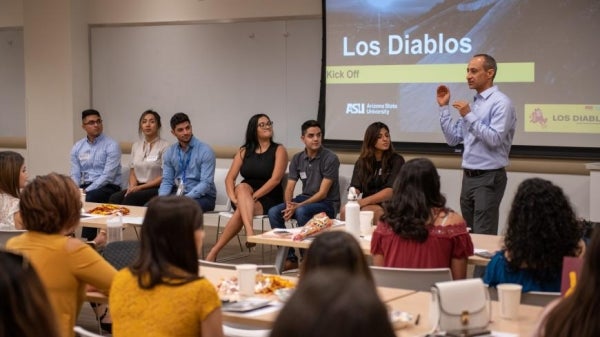In late January, Arizona State University publicly launched Campaign ASU 2020, a $1.5 billion campus-wide fundraising effort. We asked experts at the ASU Foundation, the non-profit organization that raises and invests private contributions to ASU, exactly what that means.
Question: What is a comprehensive campaign?
Rick Shangraw, chief executive officer: A comprehensive campaign is a chance for an organization to look across everything it does and put it all into a shared vision so that it can reach out to its community and to its friends to find ways to advance the institution.
Here, at ASU, Campaign ASU 2020 is designed to do just that.
Q: Why does a public university need private support?
Gretchen Buhlig, chief operating officer and managing director: Private support is not a replacement for a university’s other sources of revenue. Rather, it provides wonderful enrichment opportunities for students to transform their college experiences from good to great.
An example is a donor who provides a student the opportunity to study abroad: It provides not only a meaningful experience for the student, but the student can positively impact the community he or she is in.
Q: What areas does the campaign support?
Shad Hanselman, assistant vice president, Development Advancement: Campaign ASU 2020 supports a vast array programs, projects, and people that impact ASU’s efforts in the classroom, on the field, in the community and around the world.
Q: When did Campaign ASU 2020 begin?
Josh Friedman, chief development officer, Development Leadership: Our campaign began on July 1, 2010, at a time when ASU was contemplating many efforts that would require philanthropy to really help them reach the level we envisioned — from moving our law school downtown to dramatic improvements to ASU Gammage to huge, significant changes to Sun Devil Athletics and their facilities.
All of these require additional fundraising beyond what we were already doing, so a campaign was born.
Note: Campaign ASU 2020 was publicly launched Jan. 27, 2017. The university secured $1 billion in new gifts and commitments to advance ASU during the campaign’s pre-launch phase, which began in fiscal year 2011.
Q: Do all gifts count toward Campaign ASU 2020?
Andrew Carey, executive director, Campaign ASU 2020: All gifts to ASU — whether for a scholarship, faculty, research, equipment or any other program — count toward our goal of raising at least $1.5 billion by the year 2020.
Q: Will gifts made to the university be immediately available?
Buhlig: In donating to the university, donors can make a gift for immediate use or one that enables the success of the university to exceed their lifetimes. Non-endowed gifts provide immediate impact wherever a donor so chooses; endowed gifts are to ensure the long-term perpetuity of the success of the university. Both are essential and critical to the success of Campaign ASU 2020.
Q: How do you measure the success of a gift?
Friedman: Measuring success through philanthropy is crucial for the donor to know that they are achieving what they hope and for the institution to know that we are working to have the impact we need.
Some things are easy to measure, like scholarship dollars. Some things, like fundamentally transforming society or creating pathways to K-20 education, are bigger, harder and bolder — but that is what I’m most excited about. Those are the kinds of challenges ASU takes on. Those are the kinds of challenges our donors are most interested in. Here, we work together as partners on how we will measure that impact and what success looks like.
Q: How can I get involved?
Hanselman: The best way to get involved is to visit giveto.asu.edu, make a gift to support something you are passionate about and share why you gave with your friends, family and fellow Sun Devils.
Q: If I make a gift, how can I be sure my financial information is safe?
Shangraw: Donor privacy and security is of paramount concern to us at Arizona State University:
- We have a team of dedicated security professionals who work on our systems every day to make sure they’re safe and protected from intrusion.
- We have encryption programs that allows us to store information in a way that is difficult to access.
- When we transmit data, which we primarily do internally, we do it in a secure way.
- We have a precise record retention policy so that we only maintain those records that are necessary.
- Finally, we maintain a careful system to adhere to the wishes of our donors as to if they want their information public or not.
To learn more about Campaign ASU 2020, please visit giveto.asu.edu.
More University news

Lester Godsey joins ASU as chief information security officer
With a career spanning nearly three decades of professional IT experience, Lester Godsey is back where he first started — serving…

ASU a top-ranked university for graduate employability
Students usually seek higher education degrees to build their skills and aptitude in their chosen vocation, and advance their…

ASU Alumni Association to honor 3 outstanding alumni leaders during Homecoming
The Arizona State University Alumni Association will proudly recognize three innovative alumni leaders during the Homecoming…
